

Teaching with the Test: Questions that Build Students' Self-Awareness. Mention “teaching to the test” among educators and you will certainly hear a lot about what is wrong with education today and probably more about the importance of teaching critical thinking (and how this cannot be done when you are teaching to the test).
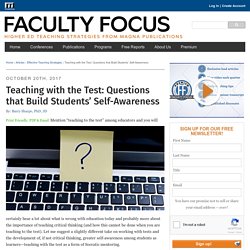
Let me suggest a slightly different take on working with tests and the development of, if not critical thinking, greater self-awareness among students as learners—teaching with the test as a form of Socratic mentoring. What do I mean by teaching with the test? Because I work with a competency-based model and am not the one responsible for grading students, I see my interactions with students primarily in terms of providing structure and guidance for self-reflection to assist students in becoming more active and self-aware learners. Teaching with the test means providing opportunities for students to practice reading, analyzing, and answering questions before taking high-stakes assessments to complete the course.
Lang, J. (2016). How Should We Respond to Student Entitlement? I discovered some good literature on the student entitlement topic while preparing for the Magna Online Seminar program I’m presenting later today.
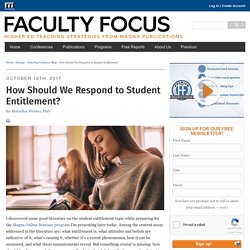
Among the content areas addressed in the literature are: what entitlement is, what attitudes and beliefs are indicative of it, what’s causing it, whether it’s a recent phenomenon, how it can be measured, and what those measurements reveal. But something crucial is missing: how should faculty respond. Some sources offer hints, but I did not find any good, substantive advice. This post then is an attempt to start the conversation and to invite your insights and suggestions for dealing with these troublesome attitudes and beliefs.
Maybe the advice is missing because confronting entitled perspectives is challenging. Student Entitlement: Truth, Fiction, or Some of Both. In recent years, many college instructors would agree that there has been a dramatic increase in students with entitled attitudes.
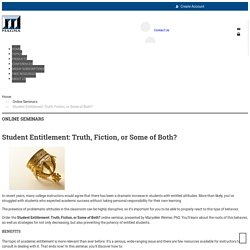
More than likely, you’ve struggled with students who expected academic success without taking personal responsibility for their own learning. The presence of problematic attitudes in the classroom can be highly disruptive, so it’s important for you to be able to properly react to this type of behavior. Order the Student Entitlement: Truth, Fiction, or Some of Both? Online seminar, presented by Maryellen Weimer, PhD. You’ll learn about the roots of this behavior, as well as strategies for not only decreasing, but also preventing the potency of entitled students. Help Quiet Students Speak Up - AICPA. Joel Lanz, CPA/CITP/CFF, CGMA, strives to ensure that all of his students have the ability—and the comfort—to speak up.
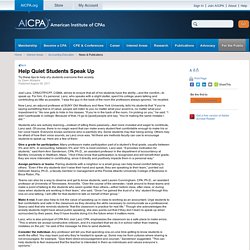
For him, it’s personal. Lanz, who speaks with a slight stutter, spent his college years talking and contributing as little as possible. “I was the guy in the back of the room the professors always ignored,” he recalled. Now Lanz, an adjunct professor at SUNY Old Westbury and New York University, tells his students that “if you’re saying something that is of value, people will listen to you no matter what your accent is, no matter what your impediment is.” Students' Self-Fulfilling Prophecies: Five Ways to Break the Cycle. June 5th, 2017 By: Melissa Wehler, PhD Faculty are often confronted by the ghosts of educators past.
In the writing intensive courses I teach, those ghosts usually manifest in one phrase: “I’m a bad writer.” This embarrassed confession bespeaks an educational experience fraught with negative beliefs and expectations, not just about their writing but about their ability to succeed in general. Sign In. Don't have a Microsoft account?

Sign up now Microsoft account What's this? Email or phone Password Can't access your account? When the Teacher Becomes the Student. As a follow-up to last week’s post, here’s a final bit from my rummaging around old favorites in my personal library of teaching and learning resources.
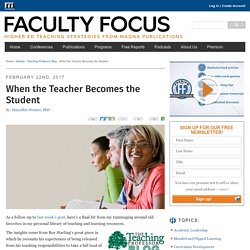
The insights come from Roy Starling’s great piece in which he recounts his experiences of being released from his teaching responsibilities to take a full load of courses with a small group of undergraduates. It radically changed his teaching, as it did Marshall Gregory’s when he enrolled in an undergraduate acting class, and as it did mine when I took a non-major’s chemistry course with 20 first-semester students. Most faculty do not have time to take courses or they’re at institutions without programs that support these experiences. However, even short visits to a colleague’s class and experiencing it as a student (not a peer reviewer) yields insights about teaching and motivates change.
Based on that experience, here are four things Starling resolved to change once he returned to teaching. Small Changes in Teaching: Making Connections - The Chronicle of Higher Education. Last week I stepped out into the backyard at 10 p.m. on a cold, crisp evening.

While the dog took care of his business, my eyes wandered up to the night sky and my mind drifted to Samuel Taylor Coleridge’s poem "Frost at Midnight": "I was reared/In the great city, pent ’mid cloisters dim,/And saw nought lovely but the sky and stars. " I had just taught the poem in my British-literature survey, and Coleridge’s depiction of the stars as a city-dweller’s lifeline to the natural world struck me with fresh intensity. The next morning I climbed onto the elliptical in my basement for my thrice-weekly torture session, and started watching the second episode of Run, a short-lived British television series depicting life among London’s tough underclass. Testing What You’re Teaching Without Teaching to the Test. Have your students ever told you that your tests are too hard?

Tricky? Unfair? Many of us have heard these or similar comments. TaxProf Blog. James Lang (Professor of English and Director of Center for Teaching Excellence, Assumption College; ), Small Changes in Teaching (March 2016): The First Five Minutes of Class: The opening five minutes offer us a rich opportunity to capture the attention of students and prepare them for learning.
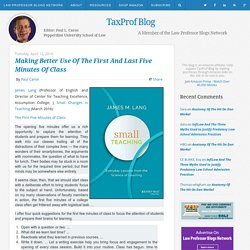
They walk into our classes trailing all of the distractions of their complex lives — the many wonders of their smartphones, the arguments with roommates, the question of what to have for lunch. Their bodies may be stuck in a room with us for the required time period, but their minds may be somewhere else entirely. 50 Education Technology Tools Every Teacher Should Know About. Via Edudemic Technology and education are pretty intertwined these days and nearly every teacher has a few favorite tech tools that make doing his or her job and connecting with students a little bit easier and more fun for all involved.
Yet as with anything related to technology, new tools are hitting the market constantly and older ones rising to prominence, broadening their scope, or just adding new features that make them better matches for education, which can make it hard to keep up with the newest and most useful tools even for the most tech-savvy teachers. Joe Hoyle: Teaching - Getting the Most from Your Students: HOW CAN WE DO BETTER? AN ASSIGNMENT. As I write this entry, I am in the middle of giving my second Financial Accounting test of the semester.
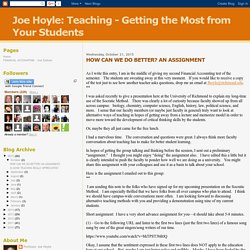
The students are sweating away at this very moment. If you would like to receive a copy of the test just to see how another teacher asks questions, drop me an email at Jhoyle@richmond.edu. I was asked recently to give a presentation here at the University of Richmond to explain my long-time use of the Socratic Method. Jane Hart's independent website about learning trends, technologies and tools. Joe Hoyle: Teaching - Getting the Most from Your Students: IS GOOD TEACHING REALLY APPRECIATED? The September 16, 2015, issue of The Wall Street Journal provided a wonderful essay by Jason Stevens titled “A Professor Who Put Teaching First.”
He writes about one of his professors (Peter W. Schramm of Ashland University) who recently died. I found almost every word to be moving. Boston Professor Uses Frequent Feedback From Class as Teaching Aide. BOSTON — Every other Monday, right before class ends, Muhammad Zaman, a Boston University biomedical engineering professor, hands out a one-page form asking students to anonymously rate him and the course on a scale of one to five. It asks more, too: “How can the professor improve your learning of the material?” “Has he improved his teaching since the last evaluation? In particular, has he incorporated your suggestions?” “How can the material be altered to improve your understanding of the material?”
“Anything else you would like to convey to the professor?” Teaching Concerns of New (and Not So New?) Teachers. The list of concerns was compiled from a qualitative analysis of 10 years of graduate teaching assistants’ online discussion posts. The 120 students wrote the posts in a three-credit course that prepared them to teach beginning communication courses. It’s a list that raises some interesting questions. Are the concerns legitimate? They are listed in order of importance. Simplifying a Teacher's Life: Free Technology Tools for Assessment. Sign In. Close the Book. Recall. Write It Down. - Faculty. Teaching Time Savers. Designing Engaging Course Documents with Piktochart. Joe Hoyle: Teaching - Getting the Most from Your Students: CREATING A FINAL EXAMINATION. Teaching - Getting the Most from Your Students: THE TEN COMMANDMENTS OF TEACHING.
Joe Hoyle: Teaching - Getting the Most from Your Students: Why We Teach. Joe Hoyle: Teaching - Getting the Most from Your Students: Two Super Articles About College Teaching. Why Flunking Exams Is Actually a Good Thing. Bob Jensen's Summary of Distance Education Pedagogy and Technology Tools. Joe Hoyle: Teaching - Getting the Most from Your Students: FOUR WAYS TO SPOT A GREAT TEACHER. How to Study Effectively. The Best Teaching Resources on the Web. Authentic Assessment Toolbox Home Page. Expectations, Underestimations, and Realities.
Joe Hoyle: Teaching - Getting the Most from Your Students: HOW TO WRITE A TEST. Joe Hoyle: Teaching - Getting the Most from Your Students: TWO WORDS FOR BETTER TEACHING. Joe Hoyle: Teaching - Getting the Most from Your Students: How Can You Get Better? Joe Hoyle: Teaching - Getting the Most from Your Students: My Favorite Quotes about Teaching – Number Five. Bob Jensen's Threads on Assessment. Joe Hoyle: Teaching - Getting the Most from Your Students. Joe Hoyle: Teaching - Getting the Most from Your Students: FOURTEEN CHARACTERISTICS OF GREAT TEACHING. How to prevent death by PowerPoint - CGMA Magazine.
Bob Jensen's Summary of Distance Education Pedagogy and Technology Tools. Accounting Profession.